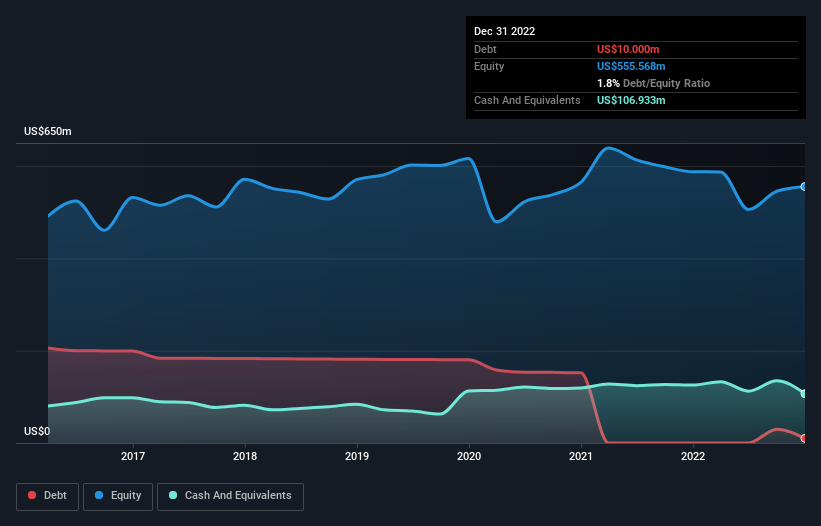Some say volatility, rather than debt, is the best way to think about risk as an investor, but Warren Buffett famously said that 'Volatility is far from synonymous with risk.' So it might be obvious that you need to consider debt, when you think about how risky any given stock is, because too much debt can sink a company. We note that Biglari Holdings Inc. (NYSE:BH.A) does have debt on its balance sheet. But the more important question is: how much risk is that debt creating?
When Is Debt Dangerous?
Generally speaking, debt only becomes a real problem when a company can't easily pay it off, either by raising capital or with its own cash flow. In the worst case scenario, a company can go bankrupt if it cannot pay its creditors. However, a more frequent (but still costly) occurrence is where a company must issue shares at bargain-basement prices, permanently diluting shareholders, just to shore up its balance sheet. Of course, plenty of companies use debt to fund growth, without any negative consequences. The first step when considering a company's debt levels is to consider its cash and debt together.
Check out our latest analysis for Biglari Holdings
What Is Biglari Holdings's Net Debt?
The image below, which you can click on for greater detail, shows that at December 2022 Biglari Holdings had debt of US$10.0m, up from none in one year. However, it does have US$106.9m in cash offsetting this, leading to net cash of US$96.9m.

How Healthy Is Biglari Holdings' Balance Sheet?
Zooming in on the latest balance sheet data, we can see that Biglari Holdings had liabilities of US$134.9m due within 12 months and liabilities of US$138.0m due beyond that. On the other hand, it had cash of US$106.9m and US$30.8m worth of receivables due within a year. So it has liabilities totalling US$135.1m more than its cash and near-term receivables, combined.
Biglari Holdings has a market capitalization of US$523.0m, so it could very likely raise cash to ameliorate its balance sheet, if the need arose. But we definitely want to keep our eyes open to indications that its debt is bringing too much risk. Despite its noteworthy liabilities, Biglari Holdings boasts net cash, so it's fair to say it does not have a heavy debt load!
Another good sign is that Biglari Holdings has been able to increase its EBIT by 25% in twelve months, making it easier to pay down debt. When analysing debt levels, the balance sheet is the obvious place to start. But you can't view debt in total isolation; since Biglari Holdings will need earnings to service that debt. So if you're keen to discover more about its earnings, it might be worth checking out this graph of its long term earnings trend.
Finally, a business needs free cash flow to pay off debt; accounting profits just don't cut it. While Biglari Holdings has net cash on its balance sheet, it's still worth taking a look at its ability to convert earnings before interest and tax (EBIT) to free cash flow, to help us understand how quickly it is building (or eroding) that cash balance. Over the last three years, Biglari Holdings actually produced more free cash flow than EBIT. That sort of strong cash generation warms our hearts like a puppy in a bumblebee suit.
Summing Up
Although Biglari Holdings's balance sheet isn't particularly strong, due to the total liabilities, it is clearly positive to see that it has net cash of US$96.9m. The cherry on top was that in converted 324% of that EBIT to free cash flow, bringing in US$98m. So is Biglari Holdings's debt a risk? It doesn't seem so to us. The balance sheet is clearly the area to focus on when you are analysing debt. But ultimately, every company can contain risks that exist outside of the balance sheet. These risks can be hard to spot. Every company has them, and we've spotted 1 warning sign for Biglari Holdings you should know about.
Of course, if you're the type of investor who prefers buying stocks without the burden of debt, then don't hesitate to discover our exclusive list of net cash growth stocks, today.
Valuation is complex, but we're here to simplify it.
Discover if Biglari Holdings might be undervalued or overvalued with our detailed analysis, featuring fair value estimates, potential risks, dividends, insider trades, and its financial condition.
Access Free AnalysisHave feedback on this article? Concerned about the content? Get in touch with us directly. Alternatively, email editorial-team (at) simplywallst.com.
This article by Simply Wall St is general in nature. We provide commentary based on historical data and analyst forecasts only using an unbiased methodology and our articles are not intended to be financial advice. It does not constitute a recommendation to buy or sell any stock, and does not take account of your objectives, or your financial situation. We aim to bring you long-term focused analysis driven by fundamental data. Note that our analysis may not factor in the latest price-sensitive company announcements or qualitative material. Simply Wall St has no position in any stocks mentioned.
About NYSE:BH.A
Biglari Holdings
Through its subsidiaries, primarily operates and franchises restaurants in the United States.
Adequate balance sheet and slightly overvalued.
Similar Companies
Market Insights
Community Narratives



